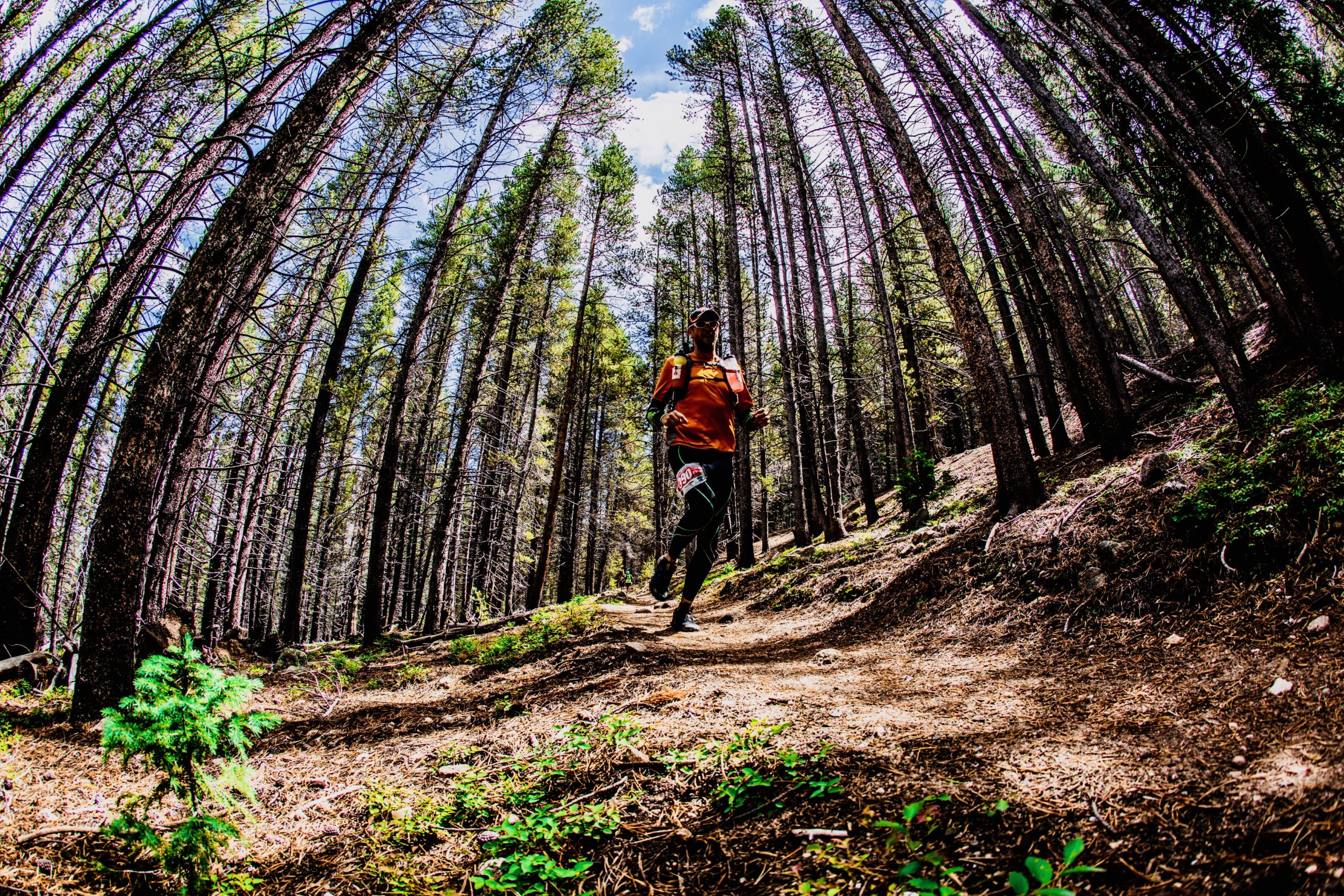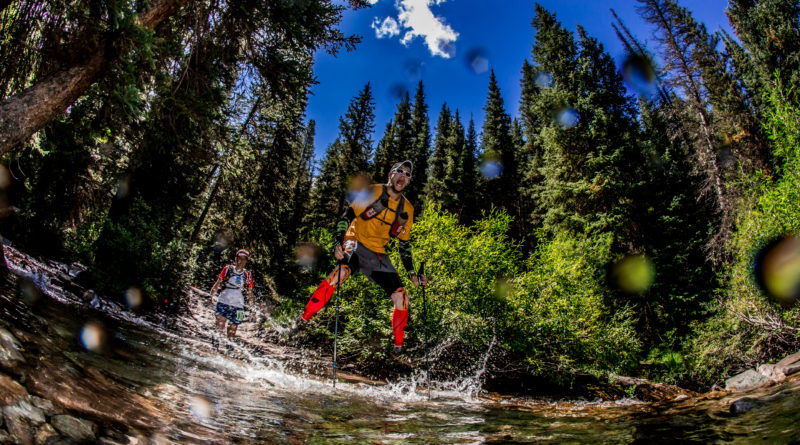The Ultra Doc
the ultra doc
Name: Joshua White Age: 44
Lives in: Barnard
Profession: Chief Medical Officer at Gifford Medical Center
Family: Wife, Kim; 12-year-old daughter, Corinne; 9-year-old son, Broder
Primary sports: Running, mountaineering
Although he has been running ultra-distance races for almost a decade (including the Moosalamoo 36-mile ultra and the 100-mile Run Rabbit Run in Colorado in 2019) Joshua White doesn’t consider himself “athletic.” A board-certified emergency medicine physician with an MBA in Health Care, White has had less time to run recently since presiding over Gifford Medical Center during the novel coronavirus outbreak.
What has it been like to work at Gifford Medical Center since the onset of Covid-19?
From the perspective of the medical practitioners, it has been much like the rest of the state with everything shut down and empty hallways. From an administrative and planning perspective, it’s been like drinking from a firehose. We have an existential threat that we don’t know much about, but still have to plan for. We have lots and lots of projects and inadequate resources and information, but we still need to make decisions.
There is also the problem of crushing financial losses since so many areas are temporarily closed. Gifford will be okay, but it is still painful. Staff members never expected to be in this position and some of them are terrified. This isn’t a business you can shut down completely or do from home, and people are afraid of getting sick. I have friends who had the virus but I’m not working with patients, so I haven’t had any contact.
One of the things that happened at Gifford is there was so much to do and the timing was so uncertain that I just started working all the time. I was asked to drop all my clinical rotations so I haven’t done any emergency room shifts in six or eight weeks.
How have hospitals changed?
The first thing was figuring out how to do social distancing and that involved shutting things down and only doing emergency surgery. We had to encourage people not to come to the hospital for annual physicals and other matters, —and that includes people with chronic diseases. We had to rethink our visitor policy. There was a craziness around supplies and we had to lock things up to prevent theft. We had to rewrite policies and protocols for patient interaction. Everyone wears masks at all times and there are different kinds of masks for different situations. We had additional training in hand hygiene, and use of face shields and gowns.
After September 11, all hospitals had to establish an official incident command system but this is the first time we’ve implemented it. We had to increase communication, including providing clinical updates, posts on social media and editorials for the newspaper. We have on-line staff meetings. We have to figure out how we are going to live in this new environment since, unless there is a vaccine, this is our new normal.
What would you do to ensure safety at an event this summer?
In the short term, I wouldn’t hold an event. A lot of races are being cancelled. We need to balance doing the things we love with safety. All the people who are worried about the economy are right to do so since your health is more than not having a disease. If you can’t put food on the table and you’re not doing the things you love, that’s not healthy. A lot of what’s going to happen is people will find a new way of doing things.
There was a recently a big backyard ultra race. It looked incredibly painful, but I followed along online and had friends who did it. That’s one way to do things.
As far as other races go, you may have to have staggered starts with race numbers and anyone 1-10 starts at one time, 11-20 at another, etc. That would complicate finishing tines, but it might make the race more exciting because you wouldn’t know where you were compared to other runners. If testing becomes readily available, one option might be that anyone who races has to be tested the week before the race.
Have you always been a runner?
For a long period of time, I despised running. I used to climb a lot and that included mountaineering. In college I discovered that if I wanted to do the big mountains of Washington

and Oregon, a certain level of conditioning was needed and trail running became my answer for that.
It got to the point where I enjoyed it quite a bit and it became something to do with my dog or my daughter. When my kids were young, I decided that a lot of the climbing I was doing was too much of a risk so I switched to running.
When did you start doing ultra-distance and endurance races?
When I was a resident at Bay State in Massachusetts in 2001, I started running with a guy who did the Vermont 50 every year so I inadvertently trained with him. Ironically, I’ve never done that race. Eventually, running ultras became something fulfilling to me. My first ultra was the Pisgah 50K in 2012 in New Hampshire. I was pretty thrilled that I finished.
Is there a race that really sticks in your mind?
I’ve only finished one 100-miler myself and I find it more fulfilling to help others race an ultra. Partly, it takes a lot of the pressure off me. My performance stops mattering. It’s really, really fun to participate in someone else’s attempt to do something audacious.
One skill set I have is a knack for logistics. It’s what you’re trained for in emergency medicine; how to solve problems really fast. A 100-mile race is just a series of problems you have to address and if you don’t get them addressed, it’s over. Someone might be low on calories or fluids or falling asleep and it’s really fun to help them accomplish their goals. I’ve made cell phone calls in the desert backcountry asking people at the aid station to find popsicles for when my runner arrives in half an hour.
One of the most grueling and fun races I took part in was the Tahoe 200 in 2018. I had a friend run that race and I paced him for 80 miles. That was a heck of a race. You get to see people go through ups and downs. You think they’re done and then they completely turn it around. I had a buddy running the Superior 100 five years ago and at mile 60 he was curled up in a ball, crying and begging to sleep, but at mile 90 he was doing eight-minute miles. To watch people perform is pretty amazing. The way people can turn around if you get them hydrated and get the calories right and the right terrain is really cool.
How did you start the Community Health Initiative in Haiti?
After I graduated from medical school, Chris Buresh, an ER doctor I had gone to school with, told me about a group going to Haiti to do medical work. He and I had travelled together for climbing and it wasn’t unusual for us to fly off to a place that people thought was crazy. We started in 2004 but after a while, we weren’t happy with the group we were going with.
The way a lot of aid in that part of the world is delivered is pretty problematic. It’s expensive and ineffective and doesn’t accomplish what you want it to. That’s true for a lot of non-profits. Outcome isn’t tied to income. I can go down to Haiti and if I take a lot of pretty pictures and tell a good story, I can come back and raise money.
It didn’t take long to realize that the medical work we were doing in Haiti was radically different from what we were doing in the States and we weren’t happy with that. We wanted to measure outcomes and be willing to admit when things went wrong and that involves being truthful to donors. That model is a far cry from most clinics which tell you how many people they saw but don’t provide other information. That’s not what matters – what matters is the outcome of the problem – and that’s really difficult to measure in a place like Haiti.
We founded our organization and got our non-profit status in 2012. I’ve rotated off the board because we want to have new ideas. Our work was interrupted by the earthquake which actually helped prepare me for this outbreak in terms of dealing with unknowns. What we’re doing needs to be primarily managed by the Haitians or it’s not sustainable.
Do you have any advice for aspiring endurance runners?
I don’t consider myself a very good athlete. I’m not athletically gifted, but I’ve found that this is something I can be successful at through dogged determination. When I was a kid I was picked last for all the sports teams in PE. I love the outdoors and it turns out that what I’m good at is suffering and continuing. I can find success when others start to quit. You’re never going to see me at the front of a race, but if you have an event where half the people drop out, I’ll do alright. —Phyl Newbeck

